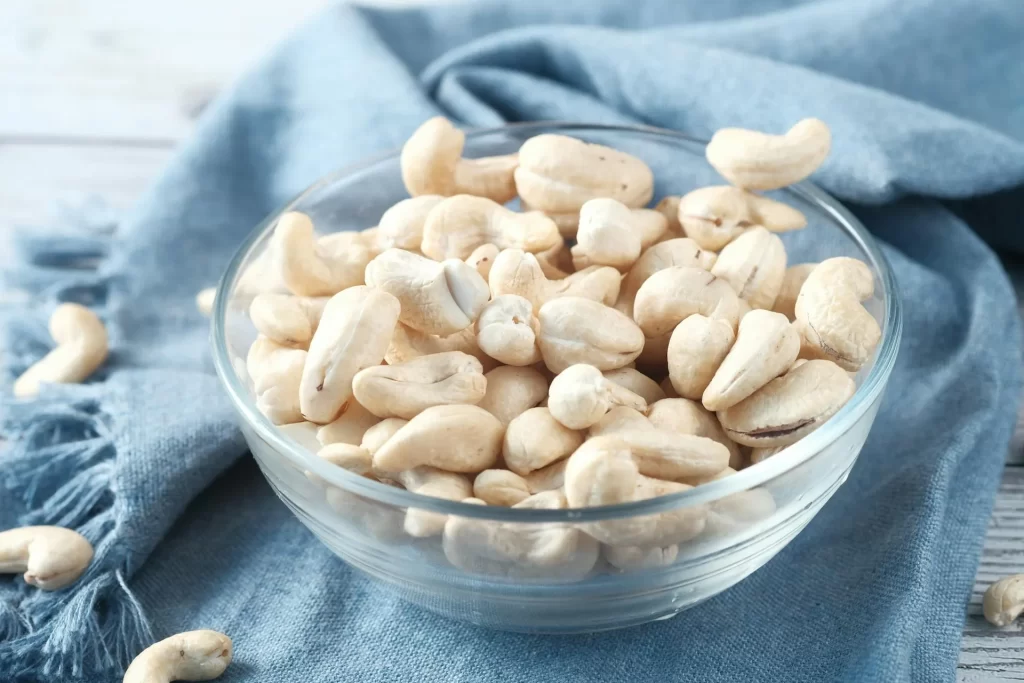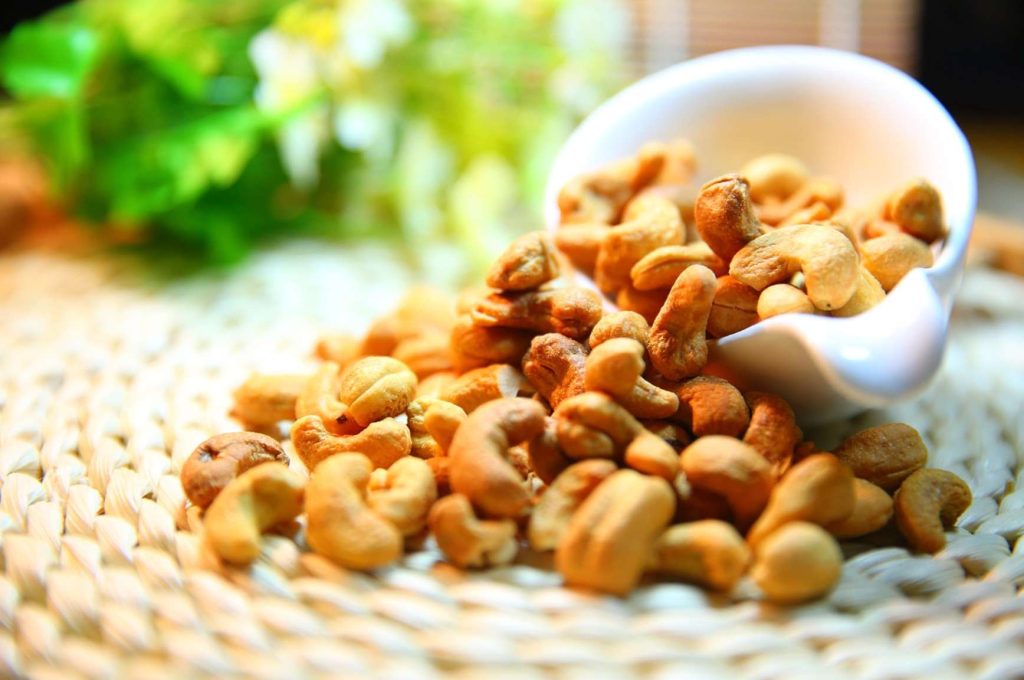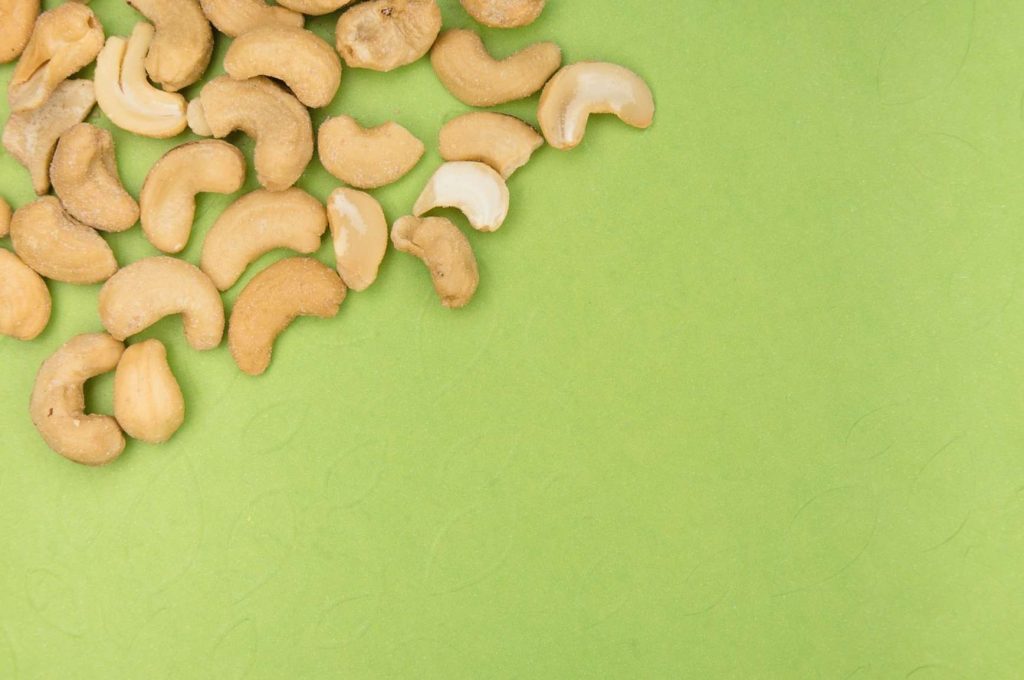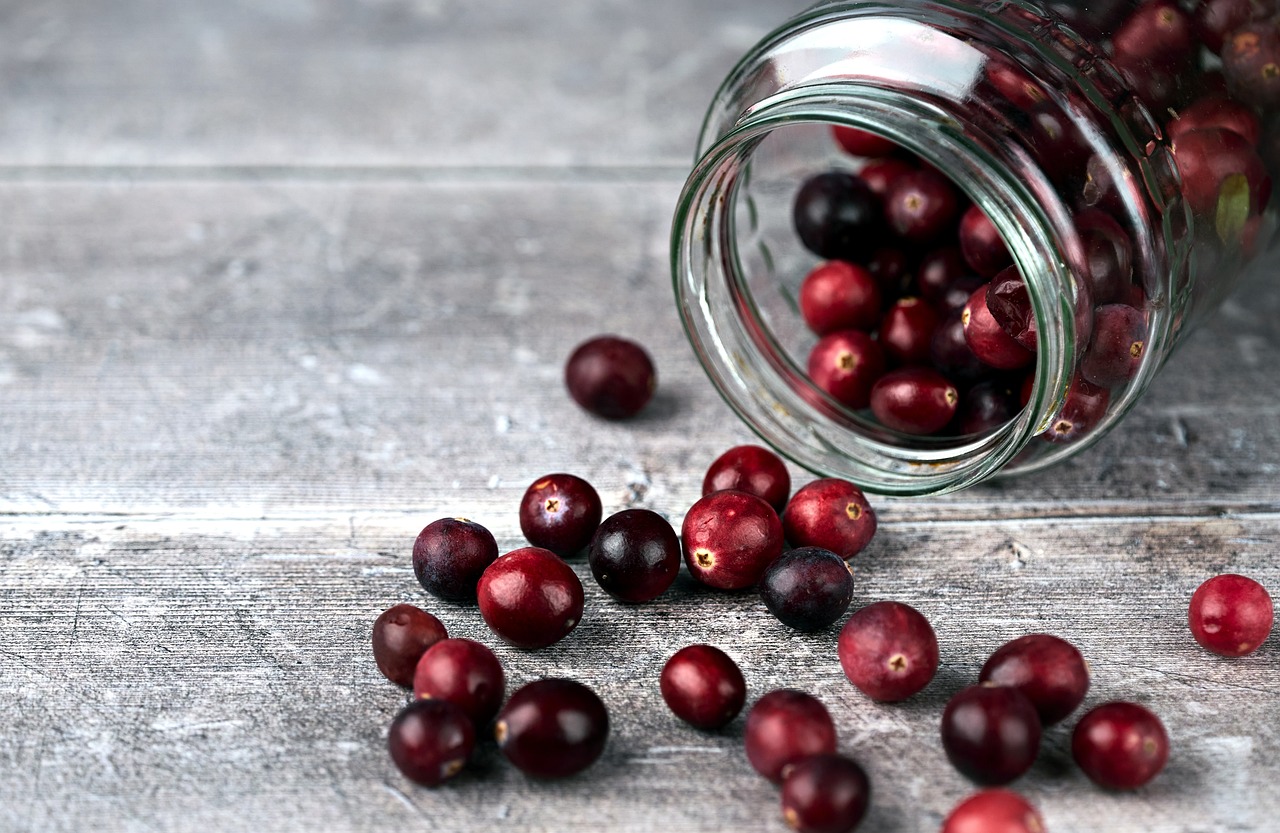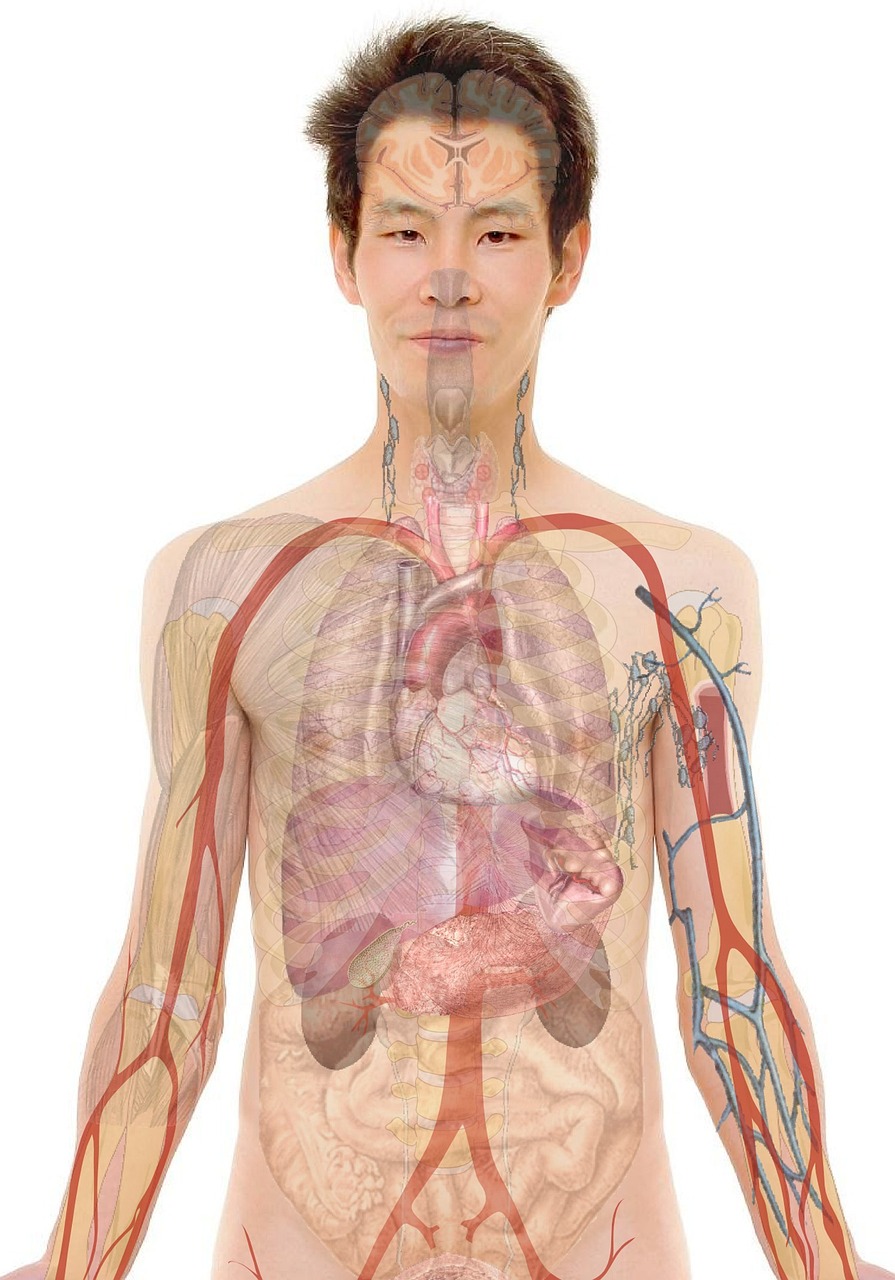Cashews are high in cholesterol, so I don’t eat them”. It was surprising to hear this from a client recently.
Unfortunately, I have heard this about Cashwes from many of my clients, so I thought I should clear the myth once and for all.
Well, technically, cashews actually don’t contain any cholesterol at all. Cholesterol is something that only animals produce, so no plant-based foods like cashews have cholesterol.
While cashews do have a bit of saturated fat, which the body can turn into cholesterol, the amount is really small.
For example, two eggs have 6-8 grams of saturated fat, but a handful of cashews have only about 2 grams.
Eating cashews also gives you fibre and minerals that are good for your heart health, which you don’t get from eggs. Cashews contain healthy fats that are beneficial for you and don’t cause your cholesterol levels to spike.
However, like all nuts and seeds, cashews are high in calories due to their fat content. That’s why I advise my clients to eat only about 1-2 tablespoons of nuts or seeds per meal.
This way, you can enjoy their benefits without consuming too many calories.
Nutrition Facts About Cashews
Cashews, or “caju” in Portuguese, are soft, sweet, and crunchy nuts known for their rich nutrients. They originally come from the Amazon rainforest in Brazil and were spread around the world by colonists to Africa and India.
Today, these regions, along with Vietnam and other African countries, are the largest producers of cashews.
Cashews are a favourite in Indian cooking because they add a creamy texture and strong flavor to dishes. Nutrition-wise, cashews are high in calories (about 553 calories per 100 grams) and packed with vitamins, minerals, dietary fibers, and phytochemicals that help protect against chronic diseases.
One of the key benefits of cashews is their content of monounsaturated fats, such as oleic and palmitoleic acids. These fats are good for the heart as they can lower bad LDL cholesterol and triglycerides while possibly increasing good HDL cholesterol.
Studies, including one in the British Journal of Nutrition, have found that people who eat nuts like cashews four times a week have a 37% lower risk of heart diseases like coronary heart disease and stroke.
Cashews also contain pantothenic acid (vitamin B5), which is crucial for creating compounds that build and break down fatty acids and enhance metabolic functions. Other important vitamins found in cashews include Vitamin B-6, riboflavin, Vitamin B-1, and Niacin.
In terms of minerals, cashews offer manganese, potassium, iron, zinc, and magnesium. They are particularly rich in selenium, a powerful antioxidant that boosts immunity, fights inflammation, promotes healthy hair and nails, supports thyroid health, and reduces oxidative stress in the body.
Another unique component in cashews is zeaxanthin, a pigmented flavonoid that the eyes absorb directly. This antioxidant helps protect the eyes from UV rays and prevents age-related vision problems.
Lastly, cashews are a great source of copper, a mineral essential for bone health but found in very few foods. A single ounce of cashews provides about 622 mg of copper, which is close to the daily recommended intake of 900 mg.
Adequate copper intake is vital as its deficiency can lead to severe osteoporosis and reduced bone density.
Does Eating Cashews Lead to High Cholesterol? Fact or Myth
- Nutritional Value – Cashews are rich in healthy fats, particularly monounsaturated and polyunsaturated fats, which are heart-friendly and promote overall health.
- Effect on Cholesterol – Cashews do not raise LDL (bad cholesterol) levels. In fact, they may improve HDL (good cholesterol), making them beneficial for heart health.
- Cholesterol Content – Cashews are naturally cholesterol-free, making them a safe snack for people concerned about their cholesterol levels.
- Portion Control – Overeating cashews can lead to weight gain, which might indirectly affect cholesterol levels. It’s recommended to eat around 1 ounce (about 18 cashews) per day.
- Studies on Cashews and Heart Health – Research shows that regular consumption of nuts, including cashews, is linked to a reduced risk of heart disease due to their healthy fat profile.
- Additional Benefits – Cashews are also rich in magnesium, antioxidants, and vitamins that support heart and overall health.
Are Cashews High In Cholesterol?
Cashews and other nuts are packed with nutrients and calories, but interestingly, they do not lead to weight gain. This might sound surprising, but several studies back up this claim.
One study focused on comparing weight loss between two groups under the same calorie conditions. Both groups consumed a low-calorie diet totaling 2,400 calories daily.
However, one group was given an additional 100 calories from nuts every day. Interestingly, by the end of the study, the group that ate nuts lost more weight than the group that did not eat nuts.
Another study looked at people’s diets and their body weight. It found that people who ate more vegetables and nuts were generally slimmer than those who consumed more meat.
Further research published in the New England Journal of Medicine suggests that weight gain is more commonly linked to eating junk and processed foods, not nuts.
In fact, a review in 2012 highlighted that nuts could help manage weight, reduce the risk of obesity, control cholesterol, improve artery health, and prevent chronic diseases.
Nuts help control cholesterol due to substances called phytosterols. These are plant-based compounds that resemble cholesterol and help block its absorption in the body. This action helps the body to get rid of both dietary and naturally produced cholesterol.
Moreover, a long-term study by researchers at Harvard examined the relationship between nut consumption and longevity. They found that people who regularly ate nuts tended to live longer and were less likely to die from cancer, heart disease, or other chronic conditions.
Therefore, instead of avoiding nuts due to their calorie content, they can be strategically incorporated into your diet as they offer significant health benefits, including potentially extending your lifespan.
Does Cashew Increase Weight?
It might be surprising, but eating nuts like cashews doesn’t typically lead to weight gain, even though they are high in calories. Here’s a simple explanation of why this happens:
1. Hard to Digest:
Some theories suggest that because nuts are hard to chew and digest, the body actually uses up calories just by processing them. A study from Japan proposed this idea, noting that the effort to eat and digest nuts might help burn off some of their calories.
2. Calories Not Absorbed:
Other theories point out that nuts like almonds contain a lot of fibre. The body doesn’t fully break down fiber, so some of the calories in nuts aren’t absorbed; instead, they pass through and are excreted.
3. Appetite Suppression:
Nuts are filling and can suppress hunger for a long time. For example, if you eat a handful of cashews that contain 150 calories, they might make you feel so full that you skip your next snack, which could have had more calories. This means you end up consuming fewer calories overall.
4. Increased Fat Burning:
Research also shows that nuts might help the body burn more fat. In one study, a group added nuts to their diet but ate the same number of total calories as a control group who didn’t eat nuts.
The nut-eating group ended up burning more fat daily than the control group. This suggests that nuts might increase the body’s metabolism.
Overall, about 70% of the calories from nuts are either burned off through dietary mechanisms or not absorbed at all. About 10% are passed directly out of the body, and the remaining 20% might help increase the metabolism, which leads to burning more fat.
So, eating cashews and similar nuts can be a great choice for your diet. They provide essential nutrition, help manage weight, and have no associated risk of chronic diseases.
Will Cashew Nuts Increase Uric Acid?
Oxalates are natural compounds found in many plant-based foods. Generally, these are harmless when consumed in normal amounts found in a balanced diet.
However, problems can arise if oxalates are absorbed excessively by the body, which can increase the risk of kidney issues such as kidney stones.
The risk of absorbing too much oxalate mainly comes from eating extremely large quantities of high-oxalate foods. For example, you’d have to eat about 20 cups of nuts a day for it to become a serious risk!
Additionally, taking very high doses of Vitamin C supplements can make things worse, as Vitamin C can convert into oxalates in the body, further increasing their levels.
People who are at a higher risk of kidney diseases or have a history of kidney stones should be careful with their oxalate intake and may need to avoid foods that are particularly high in oxalates.
Although nuts like cashews contain oxalates, they have them in relatively small amounts. Consuming more than a cup of cashews (about 25 grams) at a time could be harmful, though this is still quite a lot of nuts.
The lesson here is moderation. Even with healthy foods, it’s possible to have too much of a good thing. For instance, drinking excessive amounts of water can lead to an imbalance in your body’s electrolytes.
So, just like with any other food or drink, it’s important to consume cashews and other nuts in reasonable, moderate quantities to avoid health problems.
Can Diabetics Eat Cashews?
If you’re interested in managing diabetes, it’s a good idea to learn about the benefits of nuts like cashews. Cashews are not only tasty but also packed with nutrients that can help manage diabetes:
- High in Fiber: Cashews contain fiber, which helps slow down the absorption of sugar into the bloodstream. This can prevent sudden spikes in blood sugar levels, making them a good snack choice for diabetics.
- Rich in Nutrients for Cell Repair: Cashews provide essential nutrients that help in cell repair and maintenance, which is crucial for overall health.
- Can Lower Insulin Levels: Research has shown that Type 2 diabetes patients who get 10% of their daily calories from cashews might have lower insulin levels compared to those who don’t eat cashews at all. This suggests that cashews could help in managing insulin levels effectively.
- Improves Heart Health: Eating cashews can also benefit heart health by lowering cholesterol levels, reducing oxidation (damage from free radicals), and improving blood sugar levels and arterial function. These benefits contribute to better heart health and increased longevity.
- Weight Management: Regularly consuming nuts like cashews is linked not only to reduced mortality but also to managing weight. Eating a handful of nuts each day can provide various health benefits, including helping with weight loss.
For diabetics and others looking to gain these health benefits, the key is consistency and moderation. Eating nuts regularly, but not in excessive amounts, is recommended. By following this approach, diabetics can safely include cashews in their diet.
What Are The Benefits Of Adding Cashews To Your Diet?
Adding cashews to your diet can offer many health benefits:
1. Versatility:
Cashews are easy to include in your diet. They are available in various forms, such as raw, roasted, salted, as butter, or even spiced. You can snack on them or use them in cooking. Keep in mind that salted and flavoured cashews have more sodium and fat, so choose the type that fits your health goals.
2. Blood Sugar Control:
Despite their sweet taste, cashews are high in fibre and low in sugar, which can help lower blood sugar levels. This is beneficial for preventing Type-2 diabetes, although more research is needed to confirm the relationship between cashews and diabetes management fully.
3. Heart Health:
Cashews can improve heart health. Studies link them with a lower risk of heart disease due to their effects on blood pressure, triglycerides, and cholesterol. Eating cashews can help maintain a healthy balance of LDL (bad) cholesterol and HDL (good) cholesterol.
4. Weight Management:
Although cashews are calorie-dense, they may help in weight loss. According to the USA Food Data Central Database, a serving of cashews (about 28 grams) provides 157 calories, but the body absorbs only about 84% of these calories.
This is because some of the fat in cashews is locked within their fibrous walls and isn’t easily absorbed. Additionally, their high fiber and protein content helps suppress hunger, further aiding in weight management.
5. Rich in Antioxidants:
Cashews contain antioxidants like carotenoids, phytosterols, and polyphenols, which are important for reducing inflammation and protecting the body against chronic diseases.
6. Cholesterol Reduction:
Cashews contain lower amounts of unsaturated fats and are naturally low in cholesterol. This makes them a good option for a balanced diet without increasing the risk of high blood cholesterol.
Overall, cashews are a nutritious addition to the diet that can support various aspects of health from blood sugar levels to heart health and weight management.
So, How Many Cashews Can I Eat Per Day?
Cashew cream, which is often used in curries or as a dressing for salads, is not only delicious but also very satisfying.
It’s important to remember that while cashews are primarily composed of fats, these are healthy fats. However, they are still high in calories, so it’s best to eat cashews in moderation.
A reasonable amount to eat would be about 10-30 grams of cashews daily, especially if you’re also eating other nuts and seeds. It’s recommended that about 20 to 25% of your total daily calories should come from healthy fats, which include nuts, seeds, olives, and avocados.
FAQs
Are cashews bad for heart health?
Not at all! Cashews are packed with nutrients that support heart health, including healthy fats, magnesium, and antioxidants.
Can eating too many cashews raise cholesterol?
While cashews themselves do not raise cholesterol, overeating them can lead to weight gain, which might negatively impact cholesterol levels indirectly. Moderation is key.
Are roasted cashews healthy?
Yes, but choose dry-roasted or lightly salted versions to avoid excess sodium and unhealthy additives.
Are cashews better than other nuts for cholesterol?
All nuts, including cashews, are beneficial for cholesterol when eaten in moderation. Cashews stand out for their magnesium content, which supports heart health.
Should people with high cholesterol avoid cashews?
No, people with high cholesterol can include cashews in their diet as they provide healthy fats that can support heart health.
Do cashews fit into a weight-loss diet?
Yes, when eaten in moderation, cashews can be part of a weight-loss diet due to their satiating fats and protein content.
Also Read,
- Are Blueberries Low FODMAP? Expert Insights and Tips
- Top Fruits To Help Reduce Creatinine Levels
- The Low FODMAP Diet Plan: Get Rid of Bloating and Gas for Good
End Note
Cashews are packed with nutrients and offer many health benefits. Therefore, it’s good to ignore any unfounded myths and consider including cashews in your diet regularly.
They can be a part of a healthy eating plan, contributing valuable nutrients and helping to satisfy hunger effectively.
When I give customized diet plans to my clients, I always make sure I include all the nuts. Also, as a leading nutritionist in India, I thought that it was my responsibility to bust all the myths regarding most of the food items which have circulated. Thus, this detailed blog. Hope you got the required information.
Do let me know about other food habits that you think could be wrong.

